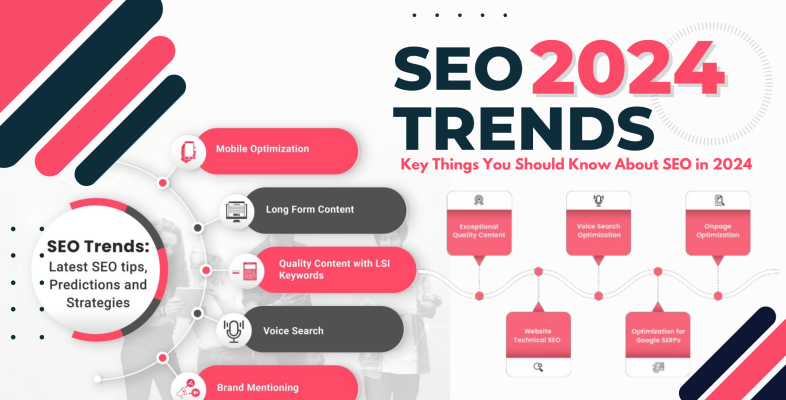
AI plays a crucial role in the current search algorithm by enhancing various aspects of the search experience. Here’s a breakdown of how AI influences the current search algorithm:
1. Understanding User Intent:
Natural Language Processing (NLP): AI helps in understanding the context and intent – behind search queries. Techniques like BERT allow Google to interpret the nuances of language, making search results more relevant to user queries.
- Contextual Relevance:
Rank Brain: Google’s machine learning system interprets and learns from new, ambiguous, or less common search queries. It helps to provide relevant results by understanding the context, even if the query does not directly match current information.
- Personalization:
User Behavior Analysis: AI algorithms analyze user behavior, search history, location, and preferences to personalize search results. This personalization tailors search outcomes to individual user interests, making results more relevant and engaging.
- Enhanced Search Features:
Featured Snippets: AI algorithms extract and display concise answers from web pages in featured snippets, providing quick and relevant information to users.
Rich Results: AI helps in generating rich results, including knowledge panels, carousels, and other structured data, offering diverse content formats to enhance the search experience.
- Image and Video Understanding:
Visual Recognition: AI-powered image and video analysis enable Google to understand visual content, allowing features like Google Images and video search. This capability helps in indexing and displaying relevant visual content in search results.
- Quality and Relevance Improvement:
Continuous Learning: Google’s algorithm continuously learns and adapts based on user interactions and feedback. AI helps identify patterns, improve search result quality, and adjust rankings for better relevance.
- Algorithmic Updates and Adaptation:
AI-Based Updated: Google’s algorithm undergoes AI-driven updates that refine its understanding of content, combat spam, and prioritize high-quality, authoritative information.
AI’s integration into the search algorithm enables Google to deliver more accurate, contextually relevant, personalized search results. It not only enhances the user experience but also drives continuous improvement in understanding user intent & providing valuable information across various content formats.
Importance of Staying Ahead in SEO Trends

Staying ahead in SEO trends is crucial for maintaining visibility and relevance in the digital landscape. Here’s why:
Visibility and Ranking:
Search engines constantly evolve their algorithms. By staying updated, you ensure your content aligns with these changes, increasing the likelihood of ranking higher in search results.
Competitive Edge:
In a competitive market, being ahead in SEO means staying ahead of competitors. It allows you to capture organic traffic that might otherwise go to them.
User Experience:
SEO trends often focus on improving user experience. Keeping up allows you to adapt your site to provide better navigation, faster loading times, and relevant content, enhancing user satisfaction.
Adaptation to New Technologies:
Trends often integrate new technologies like voice search or mobile optimization. Adapting early helps you capitalize on these technologies before others, gaining an edge.
Content Relevance:
Trends often emphasize content quality, relevance, and context. By following them, you ensure your content remains pertinent and valuable to your audience.
Maximizing ROI:
Staying updated means investing efforts in strategies that yield the best results. It prevents wasting resources on outdated or ineffective SEO practices.
Algorithm Changes:
Search engines like Google frequently update their algorithms. Keeping abreast of these changes helps you understand what’s valued in rankings, preventing sudden drops in traffic due to algorithm updates.
In essence, staying ahead in SEO trends isn’t just about rankings; it’s about ensuring your online presence remains optimized, user-friendly, and aligned with what search engines and users seek.
Technical SEO Trends
Technical SEO trends refer to the evolving practices and strategies used to optimize websites and content for search engines. These trends focus on the technical aspects that affect a website’s visibility, accessibility, and ranking in search engine results. Some key technical SEO trends for users include:

Page Speed Optimization:
Ensuring that web pages load quickly is crucial. Users expect fast-loading websites, and search engines favor sites that offer a better user experience in terms of speed.
Mobile Optimization:
With the increasing use of mobile devices, optimizing websites for mobile responsiveness is essential. Websites need to adapt and provide a seamless experience across various screen sizes.
Structured Data Implementation:
Using structured data markup (such as Schema.org) helps search engines understand and display content more effectively in search results. This can lead to rich snippets, which can improve click-through rates.
SSL/HTTPS Security:
Implementing SSL certificates to enable HTTPS encryption is important for user security. It also impacts search rankings, as search engines prefer secure websites.
Core Web Vitals:
Focusing on metrics like page loading speed, interactivity, and visual stability (such as Cumulative Layout Shift) can improve user experience and consequently impact search rankings.
Crawlability and Indexability:
Ensuring that search engine bots can crawl and index your website’s content easily is crucial for visibility. This involves proper site structure, use of robots.txt, sitemaps, and managing crawl errors.
Voice Search Optimization:
Optimizing content for voice search queries is gaining significance. Users are increasingly using voice assistants, and tailoring content to match conversational queries can enhance visibility in voice search results.
E-A-T (Expertise, Authoritativeness, & Trustworthiness)
: Emphasizing expertise, authority, & trustworthiness in content is essential for building credibility with both users & search engines.
By keeping up with these technical SEO trends, website owners & creators can improve the overall user experience, enhance visibility in search engine results, & ultimately drive more organic traffic to their websites.
Content and Keyword Trends
Here are some content and keyword trends that have been prevalent and are likely to continue shaping SEO strategies:

Search Intent Optimization:
Aligning content with user intent rather than just specific keywords. Understanding what users are looking for and providing relevant, comprehensive answers is key.
Semantic SEO:
Emphasizing context and meaning over exact keyword matching. Using related terms, synonyms, and semantically connected phrases to create more comprehensive content that covers various aspects of a topic.
Comprehensive and Long-Form Content:
Search engines tend to favor in-depth, authoritative content that thoroughly addresses a topic. Creating comprehensive, long-form content that thoroughly answers user queries tends to perform well.
Visual and Interactive Content:
Integrating various multimedia elements like videos, infographics, and interactive tools can enhance user engagement and improve SEO performance.
Topic Clusters and Authority:
Moving away from single keywords and focusing on creating content around topic clusters or themes to establish authority on broader subjects. This approach aligns with how search engines understand content relevance.
AI-Generated Content and Tools
AI (Artificial Intelligence) and machine learning are revolutionizing SEO (Search Engine Optimization) in various ways:

Algorithm Understanding and Adaptation:
Search engine algorithms, especially those of major platforms like Google, use AI and machine learning to understand user behavior, preferences, and content relevance. SEO specialists leverage this understanding to adapt their strategies for better rankings.
Predictive Analysis:
AI allows for predictive analysis based on historical data and patterns. This helps SEO professionals anticipate trends, user behavior, and algorithm changes, enabling proactive optimization.
Content Creation and Optimization:
AI-powered tools assist in content creation, optimization, and personalization. Natural language processing (NLP) helps generate content, while AI algorithms aid in optimizing keywords and structure for better search visibility.
User Experience Enhancement:
AI helps in enhancing user experience by providing personalized content recommendations, improving site navigation, and offering better user engagement, all of which indirectly affect SEO performance.
Voice Search Optimization:
As voice search grows in popularity, AI-driven algorithms aid in understanding and processing natural language queries, prompting SEO strategies to optimize content for voice-based interactions.
Pattern Recognition and Analysis:
Machine learning algorithms can identify patterns in user behavior, helping marketers tailor content, improve user journeys, and optimize websites for better engagement and conversions.
Automated Tasks and Reporting:
AI simplifies and automates repetitive tasks like data analysis, reporting, and identifying technical SEO issues, allowing professionals to focus more on strategic aspects of optimization
User Experience and Engagement Trends
User experience (UX) and engagement are pivotal in shaping online success. Some current and evolving trends in this realm include:

Personalization:
Tailoring content, product recommendations, and user interfaces based on individual preferences and behaviors enhances user engagement and satisfaction.
Mobile-First Design:
Given the surge in mobile usage, designing websites and apps primarily for mobile devices ensures a seamless and optimized experience across various screen sizes.
Page Speed and Performance:
Fast-loading pages and smooth performance significantly impact user experience. Optimizing for speed enhances engagement and reduces bounce rates.
Accessible Design:
Designing interfaces that are inclusive and accessible to users with disabilities ensures a broader reach and improved user experience for all.
Interactive Content:
Engaging users through interactive elements such as quizzes, polls, videos, and immersive experiences encourages active participation and prolonged engagement.
Voice User Interface (VUI):
With the rise of voice-enabled devices, designing interfaces that are compatible with voice commands enhances accessibility and user experience.
Sustainability and Ethical Design:
Users are increasingly drawn to platforms that prioritize sustainability and ethical design practices, such as eco-friendly operations and transparent data usage.
Emphasis on Visual Storytelling:
Leveraging visual content like videos, infographics, and storytelling through imagery enhances engagement and conveys information more effectively.
Gamification:
Integrating gaming elements or mechanics into non-gaming environments can increase user engagement and motivate desired actions.
AI-Driven Personal Assistants:
Implementing AI-driven chatbots or assistants provides real-time assistance, streamlining user interactions and improving user experience.
Local SEO and International SEO Trends
Here are some current and emerging trends in both local SEO and international SEO:
Local SEO Trends :

Google My Business Optimization :
Maximizing the use of Google My Business with accurate information, reviews, and local updates to enhance visibility in local searches.
Local Keywords and Hyperlocal Targeting :
Using location-specific keywords and targeting hyperlocal areas to attract nearby customers.
Localized Content Creation:
Creating content tailored to specific local audiences, including localized landing pages, blog posts, and social media content.
Mobile Optimization for Local Searches:
Ensuring websites are mobile-friendly as mobile searches often have local intent, emphasizing the need for a seamless mobile experience.
Voice Search and Local Queries:
Optimizing for voice search, which is often used for local queries, by incorporating conversational, long-tail keywords and addressing local needs.
Online Reviews and Reputation Management:
Encouraging and managing online reviews on platforms like Yelp or Google to build trust and credibility within the local community.
International SEO Trends :

Hreflang Tags for Language and Regional Targeting :
Implementing hreflang tags to specify language and regional targeting for international content.
Cultural and Linguistic Adaptation of Content :
Adapting content to suit cultural nuances, preferences, and language variations in different regions or countries.
Country-Specific Domain or Subdomain Strategy :
Using country code top-level domains (ccTLDs) or subdomains to establish a strong local presence and gain trust within specific countries.
International Keyword Research:
Conducting thorough keyword research to understand local search behaviors and preferences in different regions.
Global Website Structure and Navigation :
Creating a user-friendly global website structure and navigation that accommodates users from various countries or regions.
Localized Link Building and Outreach:
Building links and conducting outreach campaigns focused on local websites, directories, and influencers to improve international visibility.
Link Building and Off-Page SEO Trends
Here are some prevalent and evolving trends in link building and off-page SEO:

Quality Over Quantity:
Emphasis is placed on acquiring high-quality, relevant links from authoritative and reputable websites rather than amassing a large number of links.
Natural Link Acquisition:
Strategies focus on earning links naturally through compelling content, thought leadership, and providing value to users, rather than aggressive or manipulative link building tactics.
E-A-T (Expertise, Authoritativeness, Trustworthiness) :
Prioritizing links from sources that exhibit expertise, authority, and trustworthiness in their respective industries. Search engines value these signals when evaluating link quality.
Diverse Link Profiles:
Building a diverse link profile with a mix of different types of links (editorial, guest posts, directories, social media, etc.) rather than solely focusing on one type of link.
Brand Mentions and Unlinked Brand Citations:
Encouraging brand mentions even without direct links can improve brand visibility and indirectly influence SEO.
Local Link Building:
Targeting local directories, chambers of commerce, and community websites to build relevant links for local businesses.
Influencer Collaboration and Co-Creation:
Partnering with influencers or other brands for collaborative content creation, which often leads to natural link acquisition.
User-Generated Content and Community Building:
Encouraging user-generated content or fostering a community around your brand can lead to organic link building as users share and reference your content.
Social Signals and Engagement:
While not direct links, social signals like shares and engagement on social media platforms can indirectly impact SEO by increasing content visibility and potential link opportunities.
Link Reclamation and Broken Link Building:
Identifying unlinked brand mentions or broken links and reclaiming them or offering replacements can be an effective way to gain valuable links.
Emerging SEO Tools and Technologies
Here are some emerging SEO tools and technologies that are shaping the landscape:

AI-Powered SEO Tools:
Tools leveraging artificial intelligence and machine learning for keyword research, content optimization, and predicting search trends.
Voice Search Optimization Tools:
With the increasing use of voice assistants, tools assist in optimizing content for voice search queries and analyzing voice search patterns.
Featured Snippet Optimization Tools:
Tools designed specifically to identify opportunities and optimize content for featured snippet placement in search results.
Video SEO Tools:
Tools focused on video optimization, including keyword research for videos, video schema markup, and analyzing video performance in search.
Mobile SEO Tools:
Tools dedicated to optimizing websites for mobile devices, analyzing mobile performance, and ensuring mobile-friendliness.
Local SEO Management Platforms:
Platforms that assist in managing and optimizing local business listings, monitoring local search performance, and generating local SEO reports.
Content Optimization and Analysis Tools:
Advanced tools for content optimization, analyzing content quality, and relevance, and identifying gaps in content strategies.
Structured Data Markup Generators:
Tools that simplify the process of implementing structured data markup like Schema.org enhance rich snippets and search result appearance.
AI-Driven Analytics Platforms:
Analytics platforms utilizing AI to provide deeper insights into user behavior, trends, and predict SEO performance.
SEO Automation Tools:
Tools offering automation for routine SEO tasks like site audits, backlink analysis, rank tracking, and reporting, allowing for more efficient workflows.
Future Trends and Predictions in SEO
The future of SEO is expected to be shaped by several trends, including increased use of social media and the continued evolution of search engine algorithms.

User Experience Dominance:
Search engines will increasingly prioritize user-centric metrics like site speed, mobile-friendliness, and overall user experience as critical ranking factors.
AI and Machine Learning Integration:
AI will play a more significant role in understanding user intent, generating content, and predicting search patterns. Machine learning algorithms will refine search results and personalize user experiences.
Voice and Visual Search Growth:
With the rise of smart speakers and visual search technology, optimizing for voice queries and image-based searches will become even more important.
E-A-T and Trustworthiness:
Expertise, authoritativeness, and trustworthiness will continue to be crucial. Establishing credibility and trust through high-quality content and reputable backlinks will be a top priority.
Intent Matching and Semantic SEO:
Search engines will increasingly focus on understanding the context and intent behind search queries, moving beyond keyword matching to semantic relevance.
Privacy-Centric SEO Practices :
With growing concerns about user privacy, SEO strategies will need to adapt to ensure compliance with data protection regulations while still delivering personalized experiences.
Local and Hyperlocal Optimization:
As local searches grow in popularity, optimizing for specific places and catering to hyperlocal demands will become increasingly important, particularly for brick-and-mortar enterprises.
Video and Interactive Content Dominance:
The popularity of video content will continue to rise, and interactive content like quizzes, polls, and AR/VR experiences will gain traction for engaging users.
Featured Snippets and Zero-Click Searches:
Optimizing for featured snippets and zero-click searches will be important, as more users get immediate answers directly from search results without clicking through to a website.
Continuous Adaptation to Algorithm Updates:
SEO strategies will need to be flexible and adaptable to frequent algorithm updates, requiring constant monitoring and adjustment.
Although these forecasts offer a peek at prospective SEO trends, as technology develops and user behaviour shifts, the scene is sure to alter more.
Success in SEO in the future will depend on maintaining flexibility and modifying tactics as necessary.

By clicking the “Subscribe” button, I agree and accept the privacy policy of Monteage IT Solutions Pvt. Ltd.
- All
- Blog
- a16z generative ai
- melhores-3
How Modern Technology Shapes the iGaming Experience
Casino Online Portugal Legal: Tudo o Que Precisa Saber
a16z generative ai
{Fortune Tiger caça-níqueis — bônus|Jogo Fortune Tiger — slot online
Top kasyna online w Polsce — legalna gra
Katsaus uusiin nettikasinoihin Suomessa — toplista mobiilipelaaminen


By clicking the “Subscribe” button, I agree and accept the privacy policy of Monteage IT Solutions Pvt. Ltd.
- All
- Blog
- a16z generative ai
- melhores-3
How Modern Technology Shapes the iGaming Experience
Casino Online Portugal Legal: Tudo o Que Precisa Saber
a16z generative ai
{Fortune Tiger caça-níqueis — bônus|Jogo Fortune Tiger — slot online
Top kasyna online w Polsce — legalna gra
Katsaus uusiin nettikasinoihin Suomessa — toplista mobiilipelaaminen
- custom software development
- mobile app development
- web application development
- quality assurance
- UI/UX design
- maintenance and support


I think this is one of the most important information for me. And i am glad reading your article. But want to remark on few general things, The site style is perfect, the articles is really nice : D. Good job, cheers
Thank you for the thoughtful feedback! I’m thrilled to hear that you found the information valuable and enjoyed the article. I appreciate your compliments on the site style as well. Your encouragement really motivates me to keep writing. Cheers! 😊
I got this web site from my buddy who told me regarding this web site and at the moment this time I am visiting
this web page and reading very informative posts here.